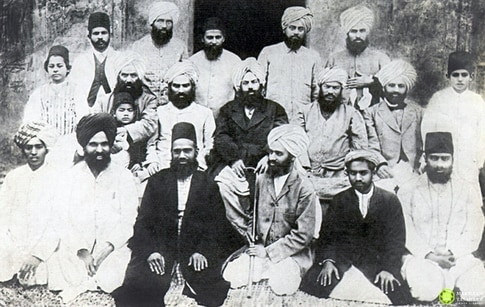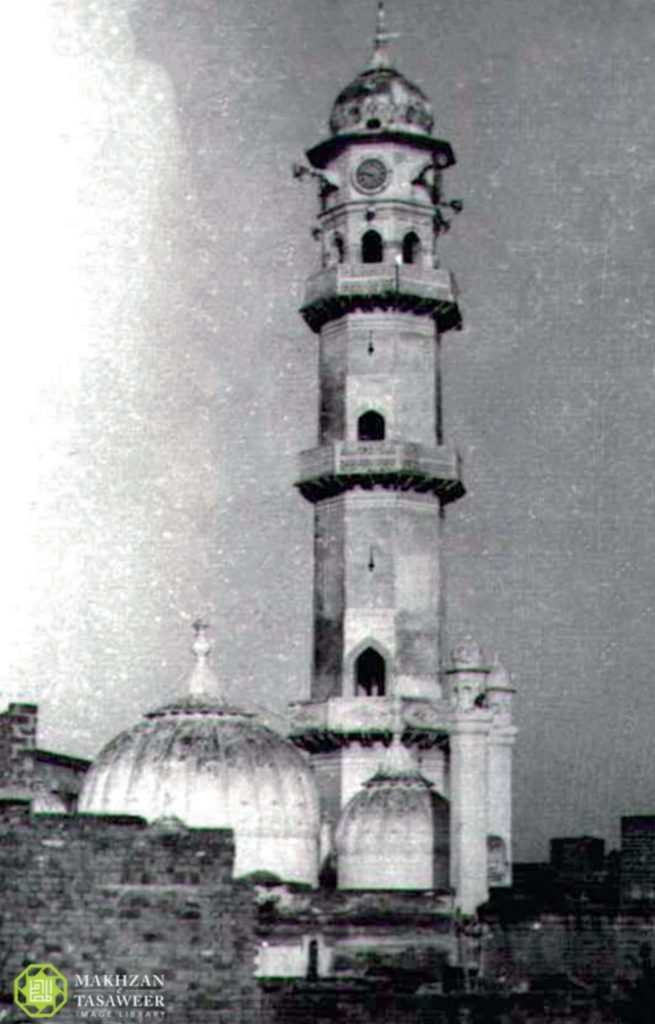A series looking at the high standard of morals of the Promised Messiahas when receiving visitors in Qadian
Awwab Saad Hayat, Al Hakam
Sheikh Muhammad Chittu Sahib was the grandfather of Hazrat Hakim Muhammad Hussain Qureshira, a well-known companion of the Promised Messiahas. Chittu Sahib was an active member of the Ahl-e-Hadith sect in his early life. One of his sons, Hazrat Mian Chiragh Dinra, was a prominent member of a noble family in Lahore.

Hazrat Hakim Muhammad Hussain Qureshira had the opportunity to read the Promised Messiah’s book, Barahin-e-Ahmadiyya, through which he fostered an ardent love for Hazrat Ahmadas and eventually did bai‘at. He has been listed on the bai‘at register at number 143 where it is noted that he did bai‘at on 14 July 1891 and it is also written that he was the grandson of Sheikh Muhammad Chittu, resident of Lahore.
Sheikh Muhammad Chittu Sahib, also known as Baba Chittu, started to become inclined towards Hazrat Mirza Ghulam Ahmadas. However, during the last days of his life, he became heavily influenced by Maulvi Abdullah Chakralvi, who would call himself a protagonist of the Ahl-e-Quran.
In October 1906, Hazrat Hakim Muhammad Hussain Qureshira brought his grandfather and two followers of Maulvi Abdullah Chakralvi to Qadian; one of whom was Dr Syed Muhammad Yusuf, who called himself and was well-known as “the traveller of Baghdad”.
Upon arrival, Hazrat Hakim Muhammad Hussain Qureshira stated that his grandfather was in search of the truth and intended to stay in Qadian for five days. (Hazrat Hakim Muhammad Hussain Qureshira narrated that since his grandfather was of fair complexion, he was famously known as Mian Chittu i.e. chata, which means white. His real name was Maulvi Muhammad Bakhsh.)
In the Al Hakam issue of 31 January 1907, along with reporting Huzoor’sas engagements of 28 October 1906, these guests have also been mentioned.
The following incident, recorded in Malfuzat, volume 5, highlights Huzoor’sas hospitality as well as an important Islamic jurisprudence issue:
“It is an act of taqwa to follow the leniencies mentioned in the Holy Quran
“The Promised Messiah, on whom be peace, merely due to his high moral excellences, after coming to know that Sheikh Chittu Sahib, as well as other people, had visited from Lahore, decided to go for a walk and also meet with them outside.
“As people were already aware that the Promised Messiahas was about to come out, they decided to wait in the choti masjid [Masjid Mubarak]. When the Promised Messiahas stepped out from his door, people present rushed towards Huzooras, as was customary.
“After seeing and saying salaam to Sheikh Sahib [Baba Chittu], Huzooras [began conversing with him] and said, ‘How are you? You are among our oldest visitors.’
Baba Chittu: Thank you.
Hazrat Ahmadas: (Whilst addressing Hakim Muhammad Hussain Sahib) It is your duty that he [Baba Chittu] should not face any inconvenience. Make full arrangements for his food and stay. Tell me if you require anything and tell Mian Najmuddin to prepare that food which [our] guest prefers and finds suitable.
Hakim Muhammad Hussain: Of course, insha-Allah.
Hazrat Ahmadas: (Whilst addressing Baba Chittu) You are travelling, so you must not be fasting?
Baba Chittu: No, I am fasting.
Hazrat Ahmadas: It is an act of taqwa to follow the leniencies mentioned in the Holy Quran. God has granted permission to those who are sick or on a journey to fast on other days, which is why one must also act upon this commandment. I have read that many great men held the view that if one is to fast during sickness or on a journey, then this is disobedience [to God] because the purpose [of fasting] is to please Allah and not oneself. Obedience to Allah is to follow all the commandments and not apply one’s own notation to it.
He has commanded:
مَنۡ كَانَ مِنۡكُمۡ مَّرِيۡضًا اَوۡ عَلٰي سَفَرٍ فَعِدَّةٌ مِّنۡ اَيَّامٍ اُخَرَ
(Surah al-Baqarah, Ch.2: V.185)
In this [commandment] no conditions have been set that one must be on such kind of journey or one’s condition of illness should be of such. I do not keep fasts during journeys, nor during sickness; thus, even today, my health is quite frail and I am not fasting. Excursion can help reduce one’s sickness, which is why I am going out [for a walk]. Would you care to join?
Baba Chittu: No, I cannot come. You may go. Though this is a commandment [of the Holy Quran], but there is no inconvenience in fasting whilst on a journey then why should one not keep fast.
Hazrat Ahmadas: This is your view. The Holy Quran has made no mention of convenience or inconvenience. Now, you are an elderly person, there is no guarantee in life. Man should choose that path which pleases Allah the Almighty and helps him reach the right path.
Baba Chittu: This is why I have come [to Qadian], so that I can gain some benefit [from your company]. If this is the true path, then let it not be that we remain negligent of it.
Hazrat Ahmadas: Yes, very good. I shall now walk for a while; you may take rest.
(After this, Hazrat Ahmadas went for a walk) (Malfuzat, Vol. 5, pp. 67-68, [1988])

On the same day, during a sitting prior to the Zuhr prayer, Hazrat Ahmadas was seated with his companions when Baba Chittu came and asked him to provide proof of his claim from the Holy Quran.
Hazrat Ahmadas replied by saying that he should test his truthfulness by the same arguments by which he had believed the Holy Quran to be true.
Upon hearing this, Baba Chittu was unable to provide any logical response. A study of the relevant pages of the fifth volume of Malfuzat, alluding to this incident, show that this guest continued to debate and did not give any importance to the etiquette of the meeting and repeatedly and hastily continued to interject the Promised Messiahas.
Huzoor’sas patience, high morals and noble example was further demonstrated when, whilst Baba Chittu continued to display his ignorance, the other guest, Syed Muhammad Yusuf, also started talking with Baba Chittu. Al Hakam has preserved the details of the meeting, which are now preserved in the volumes of Malfuzat.
On this occasion, Syed Muhammad Yusuf, after talking and trying to divert the conversation, challenged the Promised Messiahas to a mubahala (prayer duel); upon which the Promised Messiahas said that he should first read his book, Haqiqat-ul-Wahi, and then he may argue with such enthusiasm because everyone knows that for a naïve individual, rejection holds no significance. Therefore, Huzooras said, it is essential that the arguments were studied.
Hearing this, Syed Muhammad Yusuf immediately said that he would finish reading this book in two hours. Huzooras replied that he may study this in two hours, but he would then ask him a few questions to ensure that he understood the subject of the book.
On 28 October, before the Zuhr prayer, a note was written for the mubahala and at the end of this note, it was written:
“Syed Muhammad Yusuf, traveller. Date: 28 October [Signed] Hindi Baba Chittu
“[Signed] Mirza Ghulam Ahmad afaa anhu
“Witness: Khawaja Kamaluddin, Wakil”.
In the second volume of Tarikh-e-Ahmadiyyat, it is stated that after hearing the condition that Huzooras would ask him a couple of questions from the book to ensure he thoroughly understood the topic, Syed Muhammad Yusuf apologised. He then asked for three days to read the book, which he had so confidently said he would finish in 2-3 hours. Ultimately, however, they cut short the stay in Qadian , even though they were continuously asked very politely to stay and were repeatedly promised great hospitality.
They then made their way to Lahore and without disclosing the true events that transpired in Qadian, published an announcement in Isha‘at-ul-Quran magazine saying that Mirza Sahib must debate with Maulvi Abdullah Chakralvi.
This monthly magazine served as an organ of the Ahl-e-Zikr wa al-Quran and often published the views of Maulvi Abdullah Chakralvi. After his demise, this magazine came under the editorship of Maulavi Hashmat Ali of Delhi and was published at Syrianwala Bazaar, a famous bazaar in Lahore, known for selling goat’s trottersand head. Maulvi Abdullah Chakralvi was famously known in Syrianwala. His mosque, Chakralvi Mosque, was also situated near this bazaar.

The announcement published in the said magazine was attributed to Baba Chittu, but as he didn’t know how towrite Urdu or Persian, it was clear that it was composed by someone else.
For the benefit of our readers, let it be clear that Huzoor’sas book, Haqiqatul Wahi, had not yet been published and was still in preparation. This is why they had stated that Mirza Sahibas never provided the book.
When the Promised Messiahas witnessed the injustice on their part, he invited them again to a mubahala. This invitation has been preserved in the Jamaat’s newspaper, Badr, dated 17 January 1907, on page 7.
As regards debating, Hazrat Mufti Muhammad Sadiqra narrates that the Promised Messiahas wrote in his book, Anjam-e-Atham, that he had closed all series of debates and said that he would not debate anymore.
However, on this occasion, Huzooras suggested that if Maulvi Abdullah Chakralvi wished to allay his doubts, then he should put forward a request and state which verses of the Holy Quran denied his claim. However, Abdullah Chakralvi did not agree with this suggestion and Baba Chittu, soon after this, departed from this mortal world.
The Promised Messiah’sas example of hospitality for these opponents will always remain and be remembered, just as his truthfulness shall remain.

